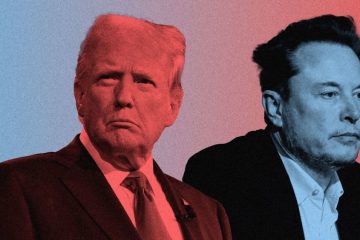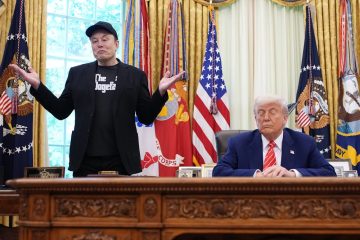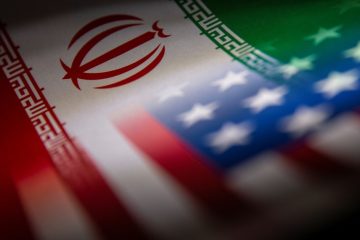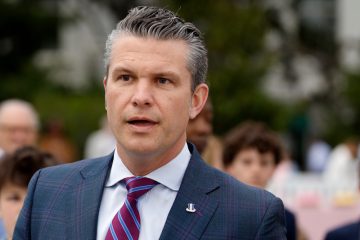Vivek Ramaswamy to Cut trillions for Trump

Vivek Ramaswamy aims to reduce expenditures by trillions in support of Trump.
Vivek Ramaswamy is poised to undertake an endeavor that contrasts sharply with his usual approach: existing in the considerable shadow of an individual who commands greater wealth and affection from the Republican electorate. The founder of the biotech firm, who identifies as a self-proclaimed alpha dog, is set to be one of two individuals at the helm of Donald Trump’s forthcoming Department of Government Efficiency. Elon Musk, the wealthiest individual globally and the newly elected president’s close associate, is the other figure of interest.
“There are few individuals I can truly admire,” Ramaswamy, 39, remarked in an interview on Thursday when questioned about his connection with Musk. “Identifying individuals who have traversed comparable life paths proves to be a challenging endeavor.” Both individuals have reportedly dedicated a significant portion of this week to their activities at Trump’s Mar-a-Lago estate in Florida.
Ramaswamy noted that he became acquainted with Musk, 53, over a year ago while competing against Trump for the Republican presidential nomination. “From our initial encounter, the concepts we are currently exploring emerged from our earliest face-to-face discussions,” he stated. “Elon and I, for our respective reasons, believed we constituted the ideal partnership for this endeavor,” Ramaswamy stated. “We have a mutual appreciation for one another.” We maintain a friendly relationship. Our collaboration is effective.
The initiative, functioning beyond the established parameters of the federal government, aims to reduce expenditures, abolish regulations, and reorganize federal agencies. The acronym DOGE pays homage to a cryptocurrency that has garnered the favor of Musk.
Elon Musk, having positioned himself as a prominent ally of Trump and a significant contributor to super PACs, has proposed the possibility of reducing government expenditure by at least $2 trillion. Elon Musk, having positioned himself as a prominent ally of Trump and a significant contributor to super PACs, has proposed the possibility of reducing government expenditure by at least $2 trillion. “We determined that the execution of this task necessitated the involvement of external parties, as it could only be effectively addressed from an outside perspective,” Ramaswamy stated. For an extended period, politicians have engaged in discussions regarding the reduction of the federal government. Adhering to conventional methods was unlikely to yield success.
Musk, having positioned himself as a prominent ally of Trump and a significant contributor to super PACs, has indicated the possibility of reducing expenditures by at least $2 trillion, although he has not clarified whether this figure pertains to an annual basis or a longer timeframe. “Stay tuned,” Ramaswamy remarked when questioned about the $2 trillion figure. A reduction of such magnitude presents significant difficulties, as substantial expenditures are often resistant to cuts. The United States is obligated to fulfill interest payments on its debt, while Trump has committed to safeguarding Social Security and Medicare benefits. Achieving Musk’s objective necessitates significant reductions in other areas, likely provoking resistance from legislators across the political spectrum.
Ramaswamy refrained from discussing details regarding DOGE, including the question of whether he and Musk would cover the salaries of their collaborators in the newly established department. He indicated that certain federal employees ought to be concerned about their employment security. “The role of the federal government is not to guarantee job security; however, it should not adopt a punitive stance towards its employees,” Ramaswamy stated. “The objective is to streamline bureaucracy, without attributing blame to individual federal employees, the majority of whom likely aspire to effectively serve their nation.”
In the realm of politics, self-assurance is abundant, yet Ramaswamy exemplifies a particularly pronounced degree of confidence. This audacity has been pivotal to his entrepreneurial achievements and a defining characteristic of his short-lived political tenure. “I must take the initiative,” he remarked to The Wall Street Journal during a blizzard in Iowa earlier this year when questioned about the prospect of being Trump’s vice presidential candidate. “I possess a quality that VPs lack.” “I possess what one might refer to as independent opinions,” Ramaswamy elaborated. “Our nation has a longstanding tradition of utilizing potted plants in that capacity, thus I would not consider myself someone who conforms to that norm.”
He stated that he would offer Trump a position as an adviser in his administration. The job offer, extended even as he lagged significantly in the polls, arrived merely three days prior to Ramaswamy’s withdrawal from the primary, at which point he promptly endorsed the former president. Since that time, he has actively supported Trump.
Ramaswamy, the offspring of Indian immigrants, obtained a degree in biology from Harvard University and subsequently secured a law degree from Yale University. He amassed considerable wealth by acquiring undervalued pharmaceutical stocks that subsequently surged in value, before establishing Roivant Sciences in 2014, a biotech startup currently valued at nearly $9 billion, aimed at advancing drugs that larger pharmaceutical companies have deprioritized. Ramaswamy has not participated in the company’s affairs since departing from its board in early 2023 to pursue his presidential campaign, though he continues to hold shares in the firm.
Vivek Ramaswamy addressed a Trump rally at Madison Square Garden in New York City last month.
His tenure with the new administration could prove to be rather short-lived. He is contemplating a bid for the governorship of Ohio in 2026, as the position currently occupied by Republican Mike DeWine will become available due to term limits. An endorsement from Trump may bolster Ramaswamy’s prospects in both the primary and general elections. In his announcement regarding DOGE, Trump stated that its completion would occur “no later than July 4, 2026,” a date that aligns with the nation’s 250th anniversary.
During his presidential campaign, Ramaswamy expressed a pronounced aversion to identity politics, emphasizing his resistance to corporate initiatives aimed at promoting political, social, and environmental agendas. He positioned himself as an outsider and a critic of government institutions. During his campaign, he advocated for the elimination or significant reorganization of several federal agencies, including the Education Department, the Federal Bureau of Investigation, the Internal Revenue Service, the Centers for Disease Control and Prevention, the Nuclear Regulatory Commission, and the Bureau of Alcohol, Tobacco, Firearms and Explosives. Ramaswamy primarily financed his campaign through personal contributions, with federal records indicating an investment of nearly $26 million. Forbes assesses his net worth at $1 billion, in contrast to Musk’s approximately $320 billion.









